At HorseWorld, our welfare team are often called out to some of the most heart-breaking situations where horses are in urgent need of help. Sadly, the most common cause is neglect, where an owner has been unable or unwilling to provide even the basic level of care, leaving the horse’s welfare at serious risk.
In other cases, we encounter deliberate abuse and cruelty, where horses not only suffer physical injuries but also carry deep emotional trauma. Sometimes these cases arise from ignorance, substance misuse, financial hardship, or sudden changes in personal circumstances. Increasingly, we are seeing situations linked to mental health struggles, where owners are simply unable to cope.
No matter the cause, our dedicated team always act with compassion, professionalism, and determination to protect each horse’s welfare. It is a challenging and often emotional role, but one that lies at the heart of our mission: to rescue, rehabilitate, and give every horse a chance of a better life.
Two for one
Many of the horses that come into HorseWorld’s care are mares that are pregnant, nursing a foal, or sometimes both. These situations present unique challenges, as the mares are often anxious and protective of their young, while foals can be unpredictable and difficult to handle during the rescue process. Extra precautions are always taken during transportation to ensure mares and foals are safe, secure, and not at risk of injury from other horses. Tragically, many of the mares we rescue arrive malnourished or emaciated, yet they still give everything they can to feed their foals. It is a heart-breaking sight to see such weakened mares sacrificing their own strength for their young.
Pregnant mares also bring their own challenges. Determining when they are due to give birth is often difficult, as rescue horses are skilled at concealing signs of labour. A further complication is that neglected mares may not produce enough colostrum, the vital first milk rich in antibodies. Without this, a foal’s immune system is compromised, and our veterinary team may need to perform a plasma transfusion to protect the newborn’s health. Close monitoring is essential in the first days of a foal’s life to ensure it is feeding properly and that the mare is producing adequate milk of the right quality. Our team works tirelessly to give both mare and foal the very best chance of survival and a brighter future.
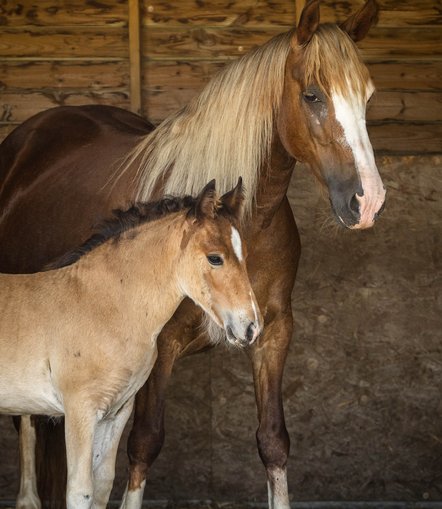
Underweight
One of the most common issues we encounter in neglect cases is the underweight horse. While we do sometimes see horses that are dangerously overweight, the majority of neglected equines arrive in a poor, emaciated condition. In fact, because many horses in leisure or companion homes are often overweight, it is a clear indication of serious neglect when a horse becomes dangerously thin. Lack of food is the most obvious cause, but it is not always the only reason. Sometimes we find one underweight horse within a herd that otherwise looks healthy. This can be due to untreated parasites such as worms or lice, dental problems that make eating difficult, or underlying health conditions such as liver disease. Chronic pain is also a significant factor; horses suffering from long-term pain may struggle to maintain weight even when food is available.
Rehabilitating an emaciated horse is a delicate process. Too much food, especially high-protein or rich feeds, introduced too quickly can be fatal. For this reason, our expert team follows a carefully structured feeding plan, starting with small amounts of fibrous forage to allow the digestive system to adjust safely. It can take several weeks before it is safe to introduce higher-energy hard feeds designed to help horses regain condition. Through patience, specialist care, and proper nutrition, many of these horses gradually recover and go on to live healthy, happy lives.
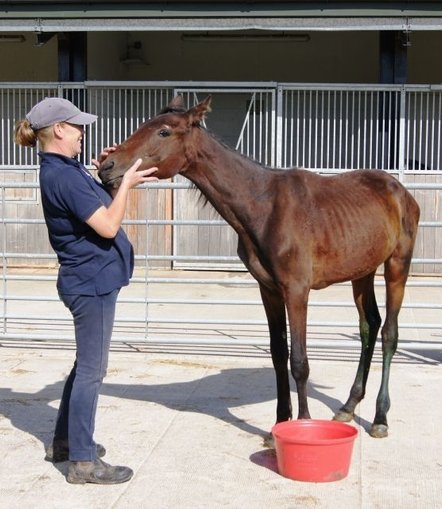
Overgrown Feet
Over the years we have unfortunately seen many overgrown or cracked hooves, which causes huge discomfort to the horse. A horse’s hooves grow continuously and need regular trimming, usually every 6–8 weeks, by a qualified farrier. When this care is neglected, the hooves can become excessively long, twisted, or misshapen, causing severe pain and mobility issues. Horses with neglected feet often struggle to walk properly and may adopt unnatural postures in an attempt to relieve discomfort. Over time, this can lead to long-term damage to the joints, tendons, and ligaments. In the worst cases, overgrown hooves can contribute to Laminitis, infections, or permanent lameness.
Correcting neglected hooves is a gradual process. Farriers cannot simply cut them back to a normal length in one visit, as this would cause further trauma and pain. Instead, the hooves must be trimmed and reshaped carefully over multiple sessions, allowing the horse’s legs and body to adjust safely. It is distressing to see horses suffering simply because they have been denied basic farriery care, yet with patient treatment and rehabilitation, many are able to make a full recovery and enjoy a pain-free future.
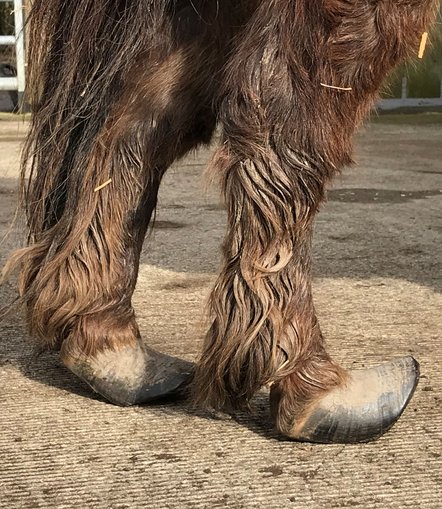
Abandonment
Sadly, horse abandonment is an issue we are seeing more frequently. Horses may be left in empty fields, tethered by the roadside, or simply deserted when their owners can no longer cope. These animals are often found without food, water, shelter, or basic care, leaving them extremely vulnerable to illness, injury, and starvation. Abandonment can happen for many reasons, including financial hardship, changes in personal circumstances, lack of knowledge, or mental health struggles. Whatever the cause, the result is the same: a horse left to fend for itself, confused, distressed, and in urgent need of help.
Rescuing abandoned horses can be complicated. Legal processes are often required before we can take the horse into our care, and in the meantime, our team works tirelessly to ensure their immediate welfare needs are met. With proper care, patience, and rehabilitation, abandoned horses can recover both physically and emotionally. At HorseWorld, we are committed to giving them a second chance, and to raising awareness so that fewer horses are left behind in the future.
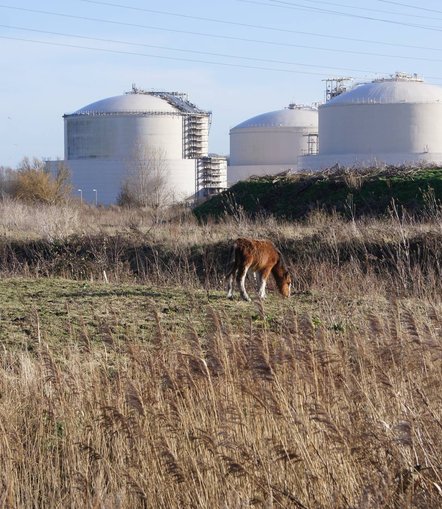
Poor or Unsuitable Living Conditions
Another welfare concern we frequently encounter is horses being kept in unsuitable or unsafe environments. Horses need clean, dry shelter and access to safe, well-managed grazing. Sadly, many neglected horses are found living in filthy stables filled with soiled bedding, or turned out in fields that are overgrazed, waterlogged, or full of hazards such as broken fencing, sharp objects, or toxic plants. Poor living conditions can quickly lead to serious health problems. Horses standing in wet, dirty environments are prone to painful conditions like mud fever, thrush, and hoof infections. Overgrazed or bare fields can cause malnutrition, while contaminated water supplies or unsafe surroundings put horses at risk of injury and illness.
Beyond the physical dangers, unsuitable environments also take a toll on a horse’s mental wellbeing. Horses are naturally social, active animals that thrive when they have space to move, graze, and interact. Being confined in cramped or isolated conditions can cause stress, frustration, and behavioural issues. At HorseWorld, we believe that every horse deserves not just food and water, but a safe, clean, and enriching environment where they can live comfortably and express natural behaviours. Rescuing horses from poor living conditions is the first step toward giving them a healthier, happier life.
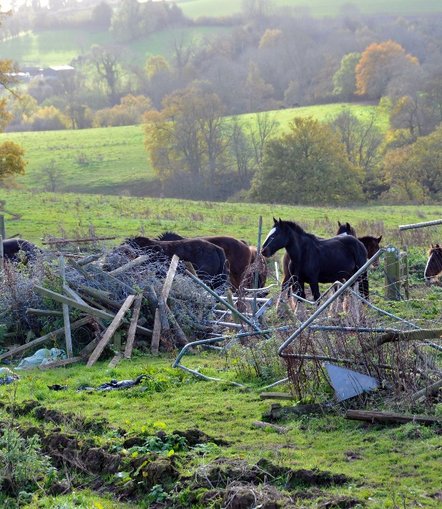
Some of the situations we have dealt with have been so truly awful that it’s almost impossible to describe. Places where starving horses are still clinging to life next to their deceased friends, and the smell of death is heavy in the air. Sometimes, the neglect, injuries, and illnesses are just so severe that the only thing we can do is help end their suffering. At least there is some comfort in knowing that, at the end, they are shown care and love - perhaps for the first time in their lives.
But amidst the heartbreak, there are also moments of incredible hope. It is deeply rewarding to see some horses come out the other side and defy all odds. Watching a once-broken horse regain its strength, spirit, and trust is nothing short of miraculous. These stories remind us why we do what we do, and they show the real impact of every act of kindness and support.
If you ever need a reminder of how powerful compassion can be, take a moment to read some of our rescue success stories. They’re living proof that with care, patience, and love, even the most desperate cases can find their way back to life.
